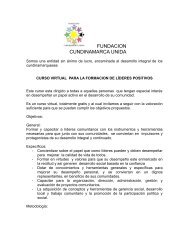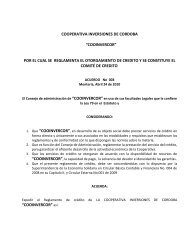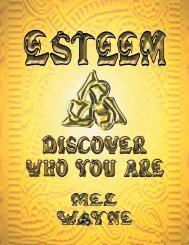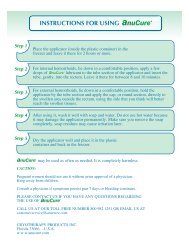The low self-esteem personalities are
The low self-esteem personalities are
The low self-esteem personalities are
Create successful ePaper yourself
Turn your PDF publications into a flip-book with our unique Google optimized e-Paper software.
“Thoughts <strong>are</strong> the most<br />
powerful force in the universe.”<br />
—Metamorphosis<br />
II
Mel Wayne<br />
III
M el Wayne<br />
Author<br />
With the vision of inspiring you to discover<br />
personal insights into who you truly <strong>are</strong>, how<br />
to immediately improve your life—<br />
“change your thinking, change your life”—<br />
Mel Wayne presents his inspirational book:<br />
Esteem: Discover Who You Are.<br />
<strong>The</strong> cure for the Dark Plague, Curse of the Universe,<br />
is presented in a new and enlightening way.<br />
Inspirational books by Mel Wayne<br />
• <strong>The</strong> Great Way<br />
• <strong>The</strong> Great Way - Deluxe Color Edition<br />
• M o r p h : S a g e o f t h e A g e s<br />
V
www.<strong>The</strong>GreatWayBook.com<br />
www.<strong>The</strong>GreatWayBlog.com<br />
www.FreedomWihinFoundation.org<br />
“<strong>The</strong>re is no time but this time;<br />
there is no moment but this moment .”<br />
—Metamorphosis<br />
Visit Mel Wayne at<br />
YouTube Facebook Twitter<br />
<br />
VI<br />
I
Table of Contents<br />
Change is Possible<br />
I. Identify Low Self-Esteem<br />
II. Recognize High Self-Esteem<br />
III. Discover Others—Discover Self<br />
IV. Silence—Learn to Listen<br />
V. Never Say “I” Until Asked<br />
VI. Eliminate Put Downs<br />
VII. Forgive and Forget<br />
VIII. Live Life as a Leader<br />
Extractor Compendium<br />
Page 9<br />
Page 13<br />
Page 32<br />
Page 36<br />
Page 40<br />
Page 46<br />
Page 52<br />
Page 58<br />
Page 66<br />
Page 82<br />
VII
i v e i f e as a e a d e r<br />
“<strong>The</strong> universe has many voices; just listen.”<br />
—Metamorphosis<br />
VIII
Change Is Possible<br />
ll things happen in perfect order.<br />
<strong>The</strong> arrival of this book in your<br />
life is no exception. You <strong>are</strong><br />
about to experience a lifechanging<br />
event, an epiphany of the highest<br />
order. You will soon discover that you do have<br />
control of your life, that change is possible.<br />
Your quest for inner change begins with an<br />
intriguing question. <strong>The</strong> question is, “What<br />
devastating Emotional Virus has infected<br />
humans throughout recorded history—since<br />
the dawn of social aw<strong>are</strong>ness”<br />
<strong>The</strong> awakening answer is: <strong>low</strong> <strong>self</strong>-<strong>esteem</strong>.<br />
You <strong>are</strong> about to discover that many people<br />
you know and love suffer from the emotionally<br />
crippling disease (dis-ease) known as <strong>low</strong> <strong>self</strong><strong>esteem</strong>.<br />
Often referred<br />
to as “egotistical<br />
behavior”, the <strong>low</strong> <strong>self</strong><strong>esteem</strong><br />
Emotional Virus<br />
has been unintentionally passed from<br />
p<strong>are</strong>nts to children, generation to generation,<br />
since the beginning of civilization. All humans<br />
suffer from some form of the Emotional Virus.<br />
If you doubt the above statement, think<br />
for a moment. Whenever <strong>low</strong> <strong>self</strong>-<strong>esteem</strong> is<br />
mentioned, the typical response is, “I don’t<br />
have <strong>low</strong> <strong>self</strong>-<strong>esteem</strong>!” <strong>The</strong> reason people deny<br />
it is because they have it and do not know it.<br />
Low <strong>self</strong>-<strong>esteem</strong> sufferers <strong>are</strong> not aw<strong>are</strong> of<br />
their condition, or they live in denial.<br />
Whenever high <strong>self</strong>-<strong>esteem</strong> is mentioned,<br />
people exclaim, without hesitation, “Oh, I<br />
have high <strong>self</strong>-<strong>esteem</strong>!” As you will soon<br />
discover during your search for happiness and<br />
contentment, the people who possess a healthy<br />
<strong>self</strong>-image never make such statements.<br />
“Keep in mind that each moment is special,<br />
that each experience has its own treasure.”<br />
—Metamorphosis<br />
<br />
Now that you have begun your quest<br />
to discover who you truly <strong>are</strong>, there is an<br />
excellent chance you <strong>are</strong> experiencing anxiety,<br />
denial, confusion, or anger. After all, you just<br />
read that your friends, relatives, coworkers,<br />
and life partner—everyone—suffers from<br />
some form of the Emotional Virus. Right now,<br />
you might be thinking, “Do I, my<strong>self</strong>, have<br />
<strong>low</strong> <strong>self</strong>-<strong>esteem</strong>” or possibly, “I know I don’t<br />
have <strong>low</strong> <strong>self</strong>-<strong>esteem</strong>; this book was written<br />
for someone else.” Perhaps you feel calm and<br />
reassured, realizing you have finally found the<br />
answer to why you <strong>are</strong> so unhappy.<br />
Whatever your reaction, one thing is<br />
certain: your desire to become a better<br />
person—to change—has brought you to this<br />
unique moment in<br />
time, to this page in<br />
this book—Esteem.<br />
Relax, breathe<br />
deeply, and begin the revelation<br />
of a lifetime—the <strong>self</strong>-discovery that you<br />
<strong>are</strong> going to change, that you <strong>are</strong> going to<br />
grow emotionally, that you <strong>are</strong> going to find<br />
contentment. For indeed, the bliss of eternity<br />
may be found in your own contentment.<br />
To begin your quest for change, you must<br />
determine how you interact with people; that<br />
is, how you behave toward others. Based on<br />
your own <strong>self</strong>-image, there <strong>are</strong> two ways you<br />
deal with the people around you:<br />
• <strong>The</strong> <strong>low</strong> <strong>self</strong>-<strong>esteem</strong> way.<br />
• <strong>The</strong> high <strong>self</strong>-<strong>esteem</strong> way.<br />
<strong>The</strong> <strong>low</strong> <strong>self</strong>-<strong>esteem</strong> way, also known as<br />
“taking the <strong>low</strong> road”, is based on intimidation,<br />
manipulation, deception, extortion, arrogance,<br />
domination, <strong>self</strong>ishness, and greed.
One or more persons “win” while all<br />
others <strong>are</strong> “losers”. You will soon discover<br />
why “taking the <strong>low</strong> road” is the behavior<br />
most people choose.<br />
<strong>The</strong> high <strong>self</strong>-<strong>esteem</strong> way, “the high road”,<br />
is based on the even exchange of what all<br />
persons, or parties, desire. <strong>The</strong> result is fair<br />
exchange, give and take, a workable solution,<br />
a consensus. Everyone feels satisfied with<br />
the results or outcome. It is a win-win-win<br />
situation.<br />
Dealing with people<br />
by always taking “the high<br />
road”—living the highest<br />
truth—al<strong>low</strong>s you to feel good about your<strong>self</strong>.<br />
To like your Self is the foundation for your<br />
happiness. You must like your Self in order<br />
to know who you truly <strong>are</strong>. Once you know<br />
your Self, you acquire the most desirable trait<br />
anyone can possess—high <strong>self</strong>-<strong>esteem</strong>—you<br />
live in a state of contentment. Bliss.<br />
A LIFE-CHANGING CONCEPT<br />
Emotional illness, often described as<br />
dysfunctional and egocentric behavior, is the<br />
result of suffering from <strong>low</strong> <strong>self</strong>-<strong>esteem</strong>, not<br />
the reverse. Stating, “I have <strong>low</strong> <strong>self</strong>-<strong>esteem</strong><br />
because I am depressed” is incorrect. <strong>The</strong><br />
correct statement is, “I am depressed because<br />
I have <strong>low</strong> <strong>self</strong>-<strong>esteem</strong>!” <strong>The</strong>refore, by<br />
eliminating <strong>low</strong> <strong>self</strong>-<strong>esteem</strong>, you eliminate<br />
depression and all your other bad habits,<br />
addictions, and egotistical behaviors.<br />
“Listen to the voice within you.”<br />
—Metamorphosis<br />
<strong>The</strong> elimination of<br />
<strong>low</strong> <strong>self</strong>-image will cure<br />
all personality disorders,<br />
including anger, impatience,<br />
violence, hatred, revenge, anxiety, loneliness,<br />
envy, jealousy, greed, racism, eating disorders,<br />
alcohol and drug abuse, dishonesty, guilt, and<br />
depression—just to name a few!<br />
When humans acquire a higher <strong>self</strong>-image,<br />
violence and war will end. Hatred and jealousy<br />
will cease to exist. Societies will function in<br />
a state of peace and cooperation. A collective<br />
10<br />
consciousness of positive thoughts—high <strong>self</strong><strong>esteem</strong>—provides<br />
the foundation for a society<br />
of loving, compassionate citizens.<br />
DO I HAVE AN EMOTIONAL VIRUS<br />
How will you know if you suffer from <strong>low</strong><br />
<strong>self</strong>-<strong>esteem</strong>—if you have been infected with<br />
the Emotional Virus—Dark Plague<br />
You will know by identifying what <strong>low</strong><br />
<strong>self</strong>-<strong>esteem</strong> looks like and acts like. You<br />
must recognize the disease<br />
symptoms. By identifying<br />
<strong>low</strong> <strong>self</strong>-<strong>esteem</strong>— egotistical<br />
behavior—you will know if<br />
you <strong>are</strong> infected with the Emotional Virus, and<br />
if the people around you <strong>are</strong> infected.<br />
To acquire freedom within, you must<br />
be able to identify all the <strong>low</strong> <strong>self</strong>-<strong>esteem</strong><br />
behaviors and eliminate them, one by one,<br />
from your life. You must change your thinking.<br />
Change your thinking means eliminate<br />
negative thoughts and replace them with<br />
positive thoughts—affirmations. <strong>The</strong> reward is<br />
inner peace. Freedom within.<br />
EPIPHANY<br />
People describe an epiphany as “a bright<br />
light turning on inside their heads”. Often<br />
described as the “ahha” moment, you will<br />
know it when it happens.<br />
Your transformation, your inner change,<br />
begins with an epiphany. <strong>The</strong> epiphany<br />
unlocks your mind to the possibility of change.<br />
Without an<br />
“In the middle of difficulty, lies opportunity.” epiphany, change<br />
—Metamorphosis<br />
in your life will<br />
never happen.<br />
A life-changing event is about to happen to<br />
you, an epiphany of the highest magnitude.<br />
As you boldly begin your quest for<br />
personal freedom—freedom within—your<br />
willingness to change rewards you with life’s<br />
greatest treasures. You <strong>are</strong> about to discover<br />
the highest truth—who you truly <strong>are</strong>—that<br />
change is possible.
Eight Ways to Change<br />
I. Identify Low Self-Esteem<br />
II. Recognize High Self-Esteem<br />
III. Discover Others—Discover Self<br />
IV. Silence—Learn To Listen<br />
V. Never Say “I” Until Asked<br />
VI. Eliminate Put Downs<br />
VII. Forgive and Forget<br />
VIII. Live Life as a Leader<br />
11
Emotional Virus<br />
12
I<br />
Identify Low Self-Esteem<br />
he identification of the Emotional<br />
Virus—<strong>low</strong> <strong>self</strong>-<strong>esteem</strong> and egotistical<br />
behavior, is the first and most<br />
revealing change in your quest for<br />
a higher <strong>self</strong>-image. It is easy to identify <strong>low</strong><br />
<strong>self</strong>-<strong>esteem</strong> characteristics by describing <strong>low</strong><br />
<strong>self</strong>-<strong>esteem</strong> personality traits.<br />
Prep<strong>are</strong> your<strong>self</strong> for an emotional<br />
revelation—an awakening—an epiphany.<br />
<strong>The</strong>re is an excellent chance you will discover<br />
some of your own character traits in the<br />
upcoming descriptions.<br />
You will either feel enlightened and<br />
experience a change of thought, or you will<br />
experience feelings of confusion and denial,<br />
becoming emotionally upset.<br />
You <strong>are</strong> about to discover that nothing, no<br />
thing, is more powerful than the truth—the<br />
highest truth—being honest with your<strong>self</strong>.<br />
Symptoms of the Emotional Virus<br />
Low Self-Esteem<br />
<strong>The</strong> Emotional Virus—<strong>low</strong> <strong>self</strong>-<strong>esteem</strong>—<br />
has reached epidemic proportions. <strong>The</strong> first<br />
question you might ask is, “How do I know<br />
this Dark Plague—Curse of the Universe,<br />
really exists” <strong>The</strong> way to uncover the truth is<br />
to ask your<strong>self</strong> simple questions about human<br />
behavior, about common personality traits.<br />
Begin with the question, “Do I, or anyone<br />
I know, act or behave angry, impatient,<br />
hotheaded, sarcastic, jealous, violent, cruel,<br />
hateful, insensitive, vain, greedy, unethical,<br />
immoral, rude, phony, paranoid, dishonest,<br />
co-dependent, obnoxious, indecent, sad, lazy,<br />
oversensitive, irresponsible, rebellious, moody,<br />
depressed, suicidal, revengeful, unforgiving,<br />
13<br />
<strong>self</strong>ish, materialistic, or envious”<br />
If you answered “No” to the above<br />
questions, ask your<strong>self</strong>, “Do I, or anyone<br />
I know, ever make fun of others, laugh at<br />
others’ mistakes, interrupt others, talk only<br />
about themselves, argue, constantly complain,<br />
scream at a spouse, yell at a child, make<br />
obscene gestures, intimidate others, tease<br />
others, dwell on the past, procrastinate, sulk,<br />
or suffer from fear of failure”<br />
If you <strong>are</strong> still answering “No”, how<br />
about, “Is anyone I know a liar, gossip, poor<br />
listener, braggart, loudmouth, talkaholic,<br />
blabbermouth, flirt, cheater, thief, racist,<br />
supremacist, workaholic, spendthrift,<br />
perfectionist, gambler, drug user, alcoholic,<br />
food abuser, sore loser, sociopath, d<strong>are</strong> devil,<br />
party animal, lazy, or reclusive loner”<br />
If you <strong>are</strong> still answering “No” to the<br />
questions, it is time to read a newspaper, a<br />
blog, the Internet, a magazine, or watch the<br />
nightly news, and you will easily identify<br />
the fol<strong>low</strong>ing <strong>low</strong> <strong>self</strong>-<strong>esteem</strong> <strong>personalities</strong>:<br />
dictators, drug lords, terrorists, carjackers,<br />
serial killers, rapists, arsonists, rioters,<br />
shoplifters, con artists, slum lords, and<br />
corrupt politicians—to name a few.<br />
After answering “No” to the questions,<br />
people reluctantly admit, “Well, maybe I do<br />
get a little impatient and yell at the kids...so<br />
what!” or “Maybe I’m guilty of taking home<br />
a pencil or paper clips from the office...big<br />
deal, it’s only small stuff!” or “When I scream<br />
at other drivers on the freeway, I feel better...<br />
anyway, they usually deserve it.”<br />
You hear statements such as, “I am doing<br />
what my p<strong>are</strong>nts taught me and look how
good I turned out!” or “So what if I get angry,<br />
or jealous, or depressed; it’s normal to feel<br />
that way!”<br />
<strong>The</strong> responses go on—and on—and on.<br />
Many people conclude their comments by<br />
declaring, “Okay, I admit I have one or two<br />
personality traits mentioned on the list, but<br />
that doesn’t mean I have <strong>low</strong> <strong>self</strong>-<strong>esteem</strong>.”<br />
Another typical response is, “I know <strong>low</strong> <strong>self</strong><strong>esteem</strong><br />
people <strong>are</strong> bad and I’m good; therefore,<br />
I can’t have <strong>low</strong> <strong>self</strong>-<strong>esteem</strong>.”<br />
Are these responses right or wrong<br />
As mentioned earlier, many people will<br />
not admit they suffer<br />
from <strong>low</strong> <strong>self</strong>-<strong>esteem</strong>.<br />
Some individuals <strong>are</strong><br />
somewhat aw<strong>are</strong> of<br />
their disorders, living in<br />
a <strong>self</strong>-denial mode, but<br />
the majority of people<br />
<strong>are</strong> simply unaw<strong>are</strong> or<br />
uneducated about what <strong>low</strong><br />
<strong>self</strong>-<strong>esteem</strong> really is—what the<br />
Emotional Virus looks like.<br />
So back to the question.<br />
When an individual admits<br />
to yelling at children and<br />
then adds, “But that<br />
doesn’t mean I suffer<br />
from <strong>low</strong> <strong>self</strong>-<strong>esteem</strong>,” is the<br />
individual right or wrong Is the<br />
statement correct or incorrect<br />
To answer now would be untimely and<br />
inappropriate, for the path to personal<br />
freedom must be traveled cautiously.<br />
First, you must find out exactly what <strong>low</strong><br />
<strong>self</strong>-<strong>esteem</strong> acts like and behaves like so you<br />
may begin your <strong>self</strong>-<strong>esteem</strong> journey—your<br />
search for a higher <strong>self</strong>-image—to discover<br />
who you <strong>are</strong>. It is time for you to meet those<br />
familiar <strong>low</strong> <strong>self</strong>-<strong>esteem</strong> characters you<br />
encounter every day of your life—at home, at<br />
work, at play, and in personal relationships.<br />
You must learn how they behave, before<br />
you learn why they behave as they do.<br />
14<br />
<strong>The</strong> <strong>low</strong> <strong>self</strong>-<strong>esteem</strong> <strong>personalities</strong> <strong>are</strong>:<br />
<strong>The</strong> Intimidator<br />
<strong>The</strong> Impatient Hothead<br />
<strong>The</strong> Power Fanatic<br />
<strong>The</strong> Sarcastic Assassin<br />
<strong>The</strong> Depressant<br />
<strong>The</strong> Oversensitive Soul<br />
<strong>The</strong> Shy Sc<strong>are</strong>dy Cat<br />
<strong>The</strong> Hypocrite Liar<br />
<strong>The</strong> Compulsive Addict<br />
<strong>The</strong> Co-Dependent<br />
<strong>The</strong> Unfriendly Phony<br />
<strong>The</strong> Procrastinator<br />
<strong>The</strong> Miserable Miser<br />
<strong>The</strong> Show Off Braggart<br />
<strong>The</strong> Unethical Trickster<br />
<strong>The</strong> Stressaholic<br />
<strong>The</strong> Gossip Monger<br />
<strong>The</strong> Talkaholic<br />
<strong>The</strong> Spoiled Brat<br />
<strong>The</strong> Conceited Looker<br />
<strong>The</strong> Pessimist<br />
<strong>The</strong> Prankster<br />
<strong>The</strong> Arguing Sorehead<br />
<strong>The</strong> Unforgiving Avenger<br />
<strong>The</strong> Unfaithful Lover<br />
<strong>The</strong> Rebel Outlaw<br />
<strong>The</strong> Moody Maniac<br />
<strong>The</strong> Angry Bigot
<strong>The</strong> Intimidator<br />
<strong>The</strong>se Controlling Characters <strong>are</strong> the<br />
domineering physical Bullies who get in your<br />
face and resort to physical violence to get<br />
their way. Preying on smaller and weaker foe,<br />
these Bullies specialize in the physical threat,<br />
obscene gesture, or sc<strong>are</strong> tactic before their<br />
opponent “gets the upper hand”.<br />
How do Intimidators function in society<br />
At home, Pushy Individuals <strong>are</strong> overbearing<br />
and rule with an iron fist, unwilling<br />
to bend or compromise.<br />
During school, Bullies choose off and<br />
intimidate everyone in the schoolyard.<br />
At work, Ruffians order coworkers around.<br />
If they <strong>are</strong> the boss, these Dominators threaten<br />
employees with demotions and terminations<br />
as part of the daily work routine.<br />
At play, Brutes wipe out their opponents,<br />
determined to beat their adversary at any cost.<br />
At personal relationships, Intimidators rule<br />
the nest by harassing their timid partner into<br />
fear and emotional submission with violent<br />
threats fol<strong>low</strong>ed by degrading put downs.<br />
<strong>The</strong> Impatient Hothead<br />
<strong>The</strong>se Volatile Characters <strong>are</strong> angry and<br />
upset about everything, finding any excuse<br />
to yell and scream at family members, friends,<br />
relatives, coworkers and any unfortunate<br />
strangers who cross their path. <strong>The</strong>se angry<br />
Loudmouths <strong>are</strong> incredibly short-tempered and<br />
easily provoked. <strong>The</strong>y <strong>are</strong> extremely impatient,<br />
unwilling to wait for anything. <strong>The</strong>y specialize<br />
in appearing calm but may explode into an<br />
uncontrollable rage without warning.<br />
How do Impatient Hotheads function in society<br />
At home, Yellers <strong>are</strong> unpredictable and<br />
shout about the least little incident.<br />
At work, Screamers recklessly raise their<br />
voices at coworkers, overreacting to mistakes.<br />
At play, Time Bombs yell insults and<br />
obscenities, especially when they <strong>are</strong> losing or<br />
not getting their way.<br />
At personal relationships, Impatient<br />
Hotheads cause their ill-at-ease partner to<br />
live in constant fear of being harassed, yelled<br />
at and screamed at—a fearful, one-sided<br />
relationship of emotional unrest.<br />
“What does <strong>low</strong> <strong>self</strong>-<strong>esteem</strong><br />
look like”<br />
—Metamorphosis<br />
“Low <strong>self</strong>-<strong>esteem</strong><br />
is not pretty!”<br />
—Metamorphosis<br />
See <strong>The</strong> Intimidator<br />
• Extractor Compendium<br />
Page 86<br />
See <strong>The</strong> Impatient Hothead<br />
• Extractor Compendium<br />
Page 86<br />
15
<strong>The</strong> Power Fanatic<br />
<strong>The</strong>se tyrannical Slave Drivers <strong>are</strong> obsessed<br />
with total power and control—craving money,<br />
cars and real estate at the expense of others.<br />
Dictators believe the oppression of people<br />
equals success. Overachievers, unable to enjoy<br />
accomplishments, set unrealistically high<br />
standards, resulting in their persistent need to<br />
prove themselves. Envious of others, the more<br />
they get—the more they want.<br />
How do Power Fanatics function in society<br />
At home, Perfectionists demand having<br />
things done their way, and only their way.<br />
At work, Controllers bark orders and call<br />
the shots, methodically plotting the overthrow<br />
of others to gain position and wealth—power.<br />
At play, Tyrants <strong>are</strong> too serious, becoming<br />
emotionally devastated when losing.<br />
At personal relationships, Power Fanatics<br />
relentlessly pursue their “prey” and once<br />
captured, their tormented partner is treated<br />
(mistreated) as a worldly possession—object.<br />
<strong>The</strong> Sarcastic Assassin<br />
<strong>The</strong>se Put Down Artists hurt your feelings.<br />
Bad Mouthers avoid physical confrontations,<br />
making you feel small and embarrassing you<br />
before you become a threat. Disguising cruel<br />
comments as friendly jokes and sarcastic<br />
statements, they complete each personal<br />
assault—put down—with, “Just Kidding!”<br />
How do Sarcastic Assassins function in<br />
society<br />
At home, Ridiculers make one put down<br />
after the other. No one escapes their wrath.<br />
At work, Put Down Specialists <strong>are</strong><br />
verbally brutal, making others feel small or<br />
embarrassed, then, laughing it off as a joke.<br />
At play, Sultans of Smack taunt and jeer<br />
opponents into total submission.<br />
At personal relationships, Sarcastic<br />
Assassins <strong>are</strong> so busy making fun of everyone<br />
else, they r<strong>are</strong>ly notice their neglected partner.<br />
<strong>The</strong>se Taunters <strong>are</strong> living proof that the<br />
tongue is mightier than the sword.<br />
“Frightful <strong>are</strong> they who<br />
suffer from <strong>low</strong> <strong>self</strong>-<strong>esteem</strong>.”<br />
—Metamorphosis<br />
See <strong>The</strong> Power Fanatic<br />
• Extractor Compendium<br />
Page 87<br />
“Low <strong>self</strong>-worth disfigures the<br />
body, mind, and spirit.”<br />
—Metamorphosis<br />
See <strong>The</strong> Sarcastic Assassin<br />
• Extractor Compendium<br />
Page 87<br />
16
<strong>The</strong> Depressant<br />
<strong>The</strong>se Downcast Characters look at life as<br />
hopeless. <strong>The</strong>y look down-hearted, long-faced<br />
and miserable. Always sad, often suicidal,<br />
Lethargics b<strong>are</strong>ly make it through the day.<br />
When asked why they <strong>are</strong> depressed, these<br />
emotionally Lost Souls search for logical<br />
answers, mumbling, “I’m not sure,” as they<br />
unhappily sigh.<br />
How do Depressants function in society<br />
At home, sullen Couch Potatoes <strong>are</strong> often<br />
asleep, or staring endlessly at the television, or<br />
mindlessly surfing the internet.<br />
At work, Poker Faces appear bored and<br />
listless, getting little accomplished.<br />
At play, Losers give up easily and when<br />
losing a game exclaim, “See, I always lose!”<br />
At personal relationships, Depressants <strong>are</strong><br />
filled with <strong>self</strong>-pity and endless complaints.<br />
Abuse of food, alcohol and drugs is often a<br />
source of psychological comfort. Functional<br />
relationships <strong>are</strong> impossible as the Melancholic’s<br />
partner suffers from emotional neglect.<br />
<strong>The</strong> Oversensitive Soul<br />
<strong>The</strong>se Overcautious Characters take things<br />
very personally. Each comment is considered<br />
a put down and every statement has a double<br />
meaning or hidden message. When you<br />
compliment them by saying their hair looks<br />
great, they <strong>are</strong> thinking “I know I must look<br />
terrible, they’re really making fun of me!”<br />
<strong>The</strong>se Paranoids, always on the defensive, <strong>are</strong><br />
unwilling to accept any compliments.<br />
How do Oversensitive Souls function in society<br />
At home, Pathetics act temperamental,<br />
hypersensitive and irreversibly irritable.<br />
At work, Thin Skins overreact to their<br />
coworkers’ comments or suggestions.<br />
At play, Overreactors <strong>are</strong> quarrelsome,<br />
easily hurt and deeply sad when losing.<br />
At personal relationships, Oversensitive<br />
Souls never open up or show their true<br />
feelings. <strong>The</strong>y <strong>are</strong> shamefully suspicious<br />
and untrustworthy of their partner. Worst<br />
yet, Head Cases overanalyze every statement,<br />
making conversation virtually impossible.<br />
“What does <strong>low</strong> <strong>self</strong>-<strong>esteem</strong><br />
look like”<br />
—Metamorphosis<br />
“Your <strong>self</strong>-<strong>esteem</strong><br />
determines how you look.”<br />
—Metamorphosis<br />
See <strong>The</strong> Depressant<br />
• Extractor Compendium<br />
Page 88<br />
See <strong>The</strong> Oversensitive Soul<br />
• Extractor Compendium<br />
Page 88<br />
17
<strong>The</strong> Shy Sc<strong>are</strong>dy Cat<br />
<strong>The</strong>se Easily Embarrassed Characters <strong>are</strong><br />
quiet, shy, and think by staying out of every<br />
person’s way, they will be popular. Cowards<br />
avoid confrontations, al<strong>low</strong>ing people to step<br />
all over them. Having every phobia imaginable,<br />
Wussies <strong>are</strong> afraid to try new things or meet<br />
new people. Fear is their greatest enemy. <strong>The</strong>ir<br />
favorite saying is “I can’t.” “I don’t want to.”<br />
How do Shy Sc<strong>are</strong>dy Cats function in<br />
society<br />
At home, which they seldom venture from,<br />
Reclusives <strong>are</strong> withdrawn, al<strong>low</strong>ing others to<br />
step all over them—do whatever they please.<br />
At work, brown-nosing Yes People <strong>are</strong><br />
intimidated by others, will not make decisions<br />
and <strong>are</strong> victims of cruel office jokes, ridicule<br />
and harassment.<br />
At play, Bashful Loners <strong>are</strong> unsociable and<br />
reluctant to get involved—join in the fun.<br />
At personal relationships, Shy Sc<strong>are</strong>dy Cats<br />
<strong>are</strong> timid, coy and lack confidence, expecting<br />
their partner to carry the emotional load.<br />
<strong>The</strong> Hypocrite Liar<br />
<strong>The</strong>se Deceiving Characters <strong>are</strong> two-faced<br />
liars, fibbers and perjurers. Sham Artists have<br />
been untrue to themselves and others since<br />
childhood, graduating from little white lies to<br />
huge whopping lies. By adulthood, Deceivers<br />
lie so much they forget where the lie ends and<br />
the truth begins. <strong>The</strong>y believe their own lies.<br />
How do Hypocrite Liars function in<br />
society<br />
At home, Liars fib from morning to night,<br />
and when caught, firmly deny each lie.<br />
At work, Fibsters make coworkers uneasy<br />
and employees mistrustful, often destroying<br />
the integrity of the work place.<br />
At play, Poor Sports lie through their teeth<br />
just to win. Cheating is part of the game.<br />
At personal relationships, Hypocrite Liars<br />
create such an unstable family atmosphere<br />
that their partner lives with frequent<br />
feelings of deceit and betrayal, all because<br />
smooth-tongued, lip-serving Charlatans <strong>are</strong><br />
untrustworthy.<br />
“When you act ugly,<br />
ugly you become.”<br />
—Metamorphosis<br />
See <strong>The</strong> Moody Maniac<br />
• Extractor Compendium<br />
Page 99<br />
“What does <strong>low</strong> <strong>self</strong>-<strong>esteem</strong><br />
look like”<br />
—Metamorphosis<br />
See <strong>The</strong> Angry Bigot<br />
• Extractor Compendium<br />
Page 99<br />
18
<strong>The</strong> Compulsive Addict<br />
<strong>The</strong>se Compulsive Characters <strong>are</strong> obsessive,<br />
<strong>self</strong>-indulgent and out of control. Whether<br />
their bad habit happens to be food, drugs,<br />
alcohol, cig<strong>are</strong>ttes, gambling, shopping, or<br />
sex, these addicts do not know when to quit.<br />
Self-Destructors have no willpower and <strong>are</strong><br />
psychologically dependent on <strong>self</strong>-pleasure and<br />
immediate gratification.<br />
How do Compulsive Addicts function in society<br />
At home, Addicts <strong>are</strong> unstable and enslaved<br />
to the refrigerator, the television, the internet,<br />
the bedroom, the bottle, or some other form of<br />
instant pleasure.<br />
At work, Abusive Selfaholics <strong>are</strong><br />
See <strong>The</strong> Low Self-Esteemer—Ex<br />
• Extractor Compendium<br />
Pages 100 and 101<br />
19<br />
unproductive and uncooperative, lacking the<br />
fortitude or stability to focus on objectives.<br />
At play, which they seem to be good at,<br />
Self-Abusers love to have unending fun, often<br />
at the expense of others.<br />
At personal relationships, Compulsive<br />
Addicts <strong>are</strong> held captive by lifelong bad habits.<br />
<strong>The</strong>se Craveaholics have no time for their<br />
neglected partner, only their own obsessions.<br />
<strong>The</strong> Co-Dependent<br />
<strong>The</strong>se Manipulators <strong>are</strong> dependent on<br />
the people around them, obsessed with<br />
controlling the other person’s behavior.<br />
Enablers <strong>are</strong> the Reactionary C<strong>are</strong>takers of<br />
society; that is, they either over react or under<br />
react to the dysfunctional behavior of others.<br />
Overcommitters feel bored or worthless<br />
without a crisis occurring or someone to help.<br />
How do Co-Dependents function in society<br />
At home, Busybodies anticipate family<br />
member’s needs, then react by helping, then<br />
feel victimized, used and unappreciated.<br />
At work, Control Freaks dominate others<br />
and stick their nose where it does not belong.<br />
At play, Whiners say “yes” when they really<br />
mean “no”, disrupting the game.<br />
At personal relationships, Co-Dependents<br />
fail to say what they mean and never mean<br />
what they say. Sociopathic Martyrs force<br />
advice on others, then become upset and<br />
resentful, eventually ending the dysfunctional<br />
<strong>self</strong>-pity cycle with, “I’m being used...why am<br />
I never appreciated After all I’ve done!”<br />
<strong>The</strong> Unfriendly Phony
<strong>The</strong>se Cruel Characters <strong>are</strong> unsociable,<br />
unneighborly and inhospitable. When you<br />
say “hello” or “good morning” they pretend<br />
they did not hear you and look the other way.<br />
Appearing aloof and uppity, Rude Ignorers can<br />
be extremely mean and uncaring. However,<br />
High and Mighties become suddenly friendly<br />
around people they choose to like.<br />
How do Unfriendly Phonies function in<br />
society<br />
At home, Uppities <strong>are</strong> cold and distant,<br />
outwardly ungrateful and snobbish when<br />
complemented by a family member.<br />
At work, Socialites <strong>are</strong> uncooperative and<br />
not considered a team player.<br />
At play, Arrogants form a clique of<br />
belligerent allies, rudely ignoring opponents.<br />
At personal relationships, Unfriendly<br />
Phonies stay at an arms length, expecting their<br />
insulted partner to tolerate habitual rude and<br />
ungrateful behavior. Stuck-<br />
Up Snobs hurt everyone’s<br />
feelings—everywhere they go.<br />
<strong>The</strong><br />
Procrastinator<br />
<strong>The</strong>se Highly Unsuccessful Characters <strong>are</strong><br />
irresponsible, unambitious and lazy. <strong>The</strong>y<br />
<strong>are</strong> often uneducated and make every excuse<br />
to stay that way. Excusaholic Goof Offs <strong>are</strong><br />
society’s social drop outs—totally afraid of<br />
success and always expecting failure.<br />
How do Procrastinators function in society<br />
At home, Dawdlers mope around and stall<br />
projects, never finishing a task or project.<br />
20<br />
Schoolwork is considered taboo and totally<br />
avoided by Underachievers.<br />
At work, if they even have a job,<br />
Backsliders <strong>are</strong> methodically tardy, faithfully<br />
ignoring their duties—b<strong>are</strong>ly getting by.<br />
At play, perennial Quitters fall short of<br />
expectations and <strong>are</strong> appropriately labeled as<br />
Losers.<br />
At personal relationships, Underachieving<br />
Procrastinators evade all responsibility.<br />
Postponing positive events, Hesitaters become<br />
an emotional goldbrick to their frustrated and<br />
discontented partner.<br />
<strong>The</strong> Miserable Miser<br />
<strong>The</strong>se Miserable Characters <strong>are</strong> moneygrubbing,<br />
penny-pinching, miserable<br />
Tightwads. <strong>The</strong>y believe money is not<br />
everything; money is the ONLY<br />
“<strong>The</strong>re is no way to happiness; thing. Scroogies, greedy and<br />
happiness is the way.” extremely stingy, never sh<strong>are</strong><br />
—Metamorphosis with others. Hoarding began<br />
in childhood when they tenaciously<br />
refused to sh<strong>are</strong> their toys.<br />
How do Miserable Misers function in society<br />
At home, Controller’s decisions revolve<br />
around finances. Money is king. Activities <strong>are</strong><br />
discouraged or cancelled because of cost.<br />
At work, Greedaholics act suspicious,<br />
mistrustful and step on others for a pay raise.<br />
<strong>The</strong>y join coworkers for lunch, but when the<br />
bill arrives they sadly moan, “Gee, I forgot my<br />
money!” while moths fly from their wallet.<br />
At play, Hoarders <strong>are</strong> too serious about<br />
winning and <strong>are</strong> poor losers.
First Universal Truth:<br />
“Like Attracts Like”<br />
First Great Treasure: Love<br />
<strong>The</strong> Eternal Rose<br />
at the Sea of Esteem<br />
21
















